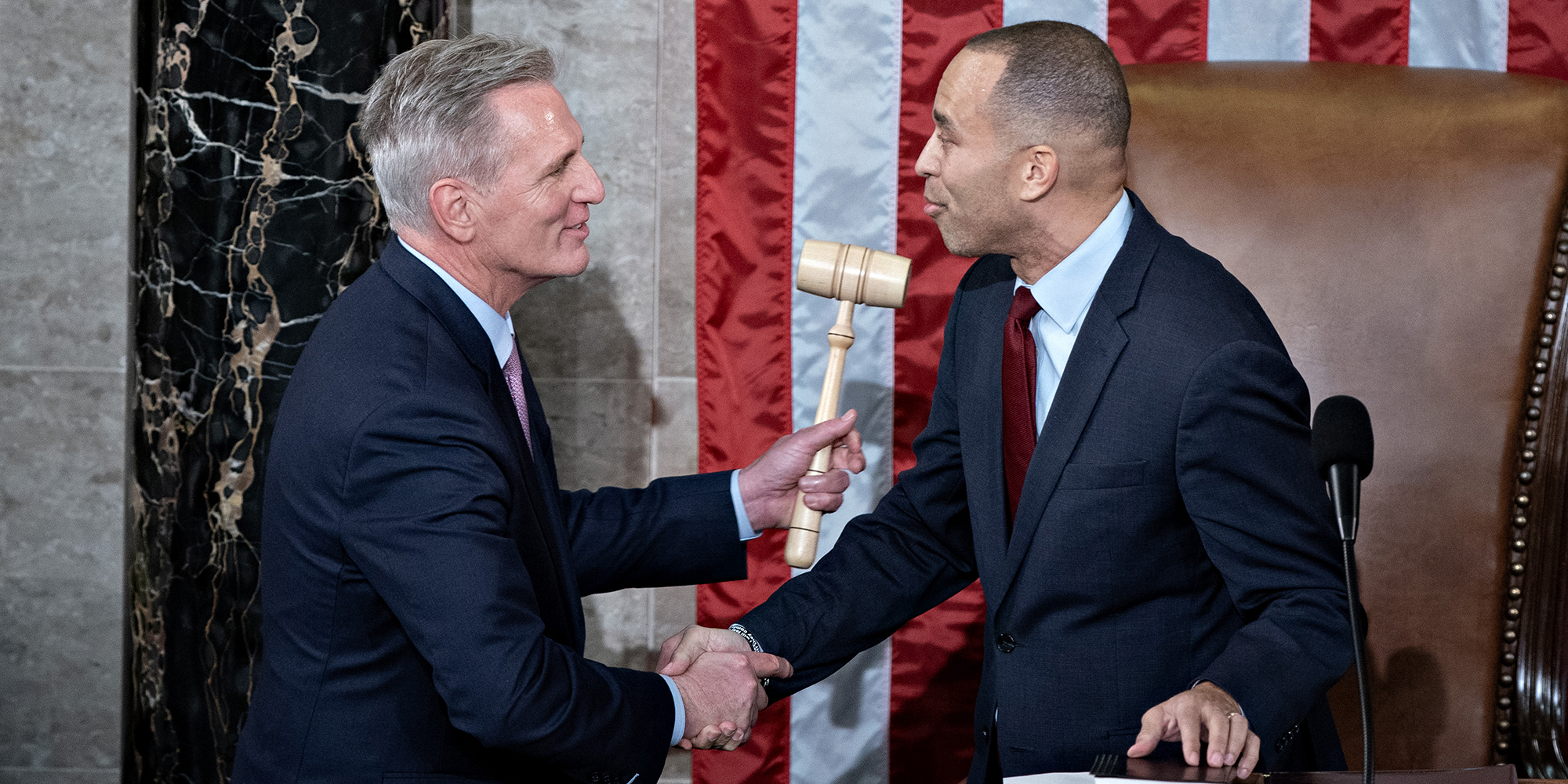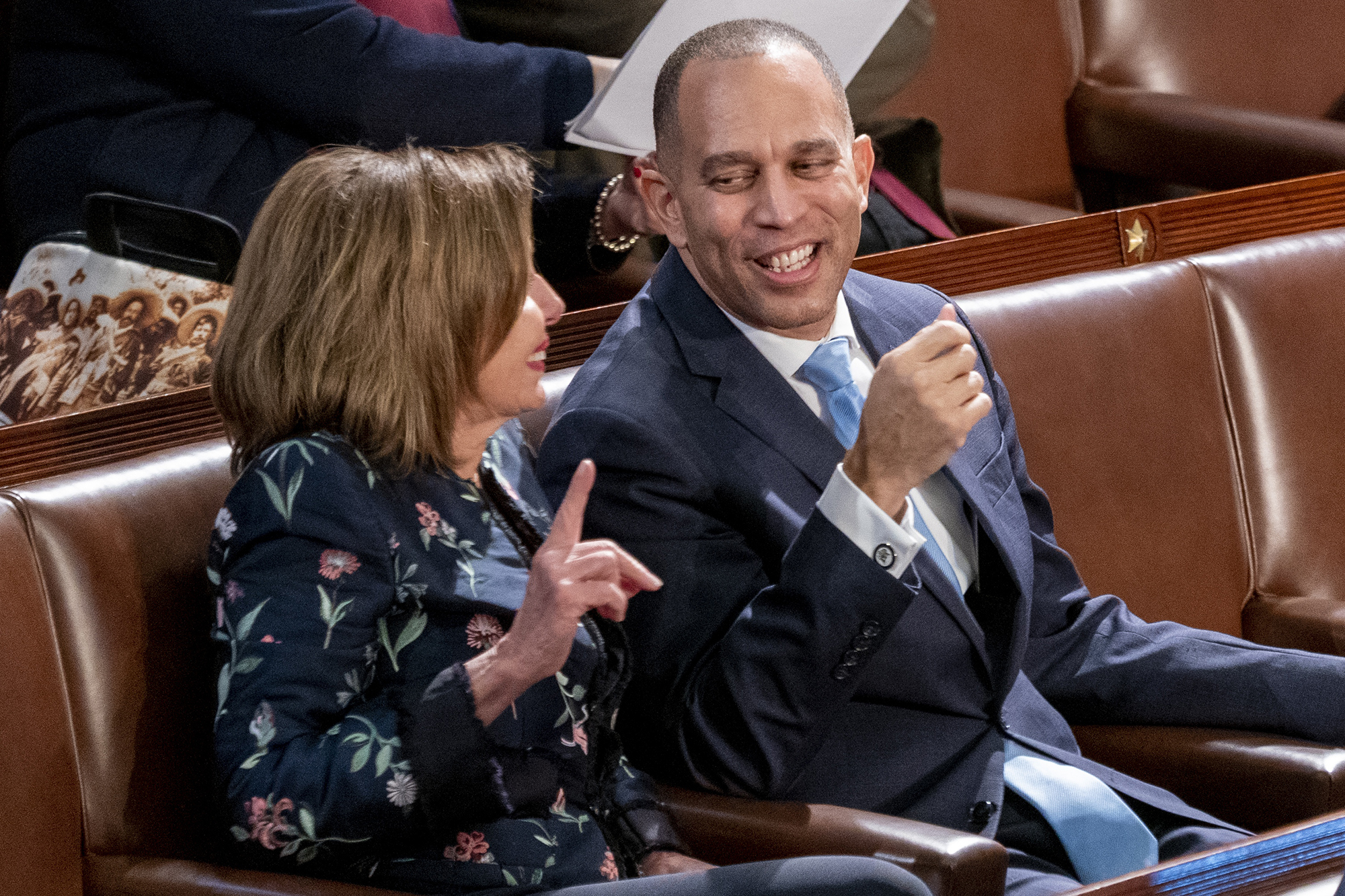US POLITICS
What to expect from the ‘squeaker of the House’ after Kevin McCarthy stumbles across the finish line

Kevin McCarthy has finally lurched across the finish line to become Nancy Pelosi’s successor as speaker of the House, now that the Republicans have a tiny majority in that body. What happened and what should we look for in the future?
As a result of the outcome of the US’s 2022 mid-term elections with a tiny Republican majority and thus the conclusion of Nancy Pelosi’s time as speaker of the House for the US House of Representatives, a new era in the US government begins. How this will play out for both domestic affairs and foreign policy still needs to become much clearer, but there are certain facts we can already ascertain about the probable shape of things to come.
After 15 successive ballots, California Republican congressman Kevin McCarthy finally achieved what has been his lifelong ambition. Under most circumstances, such an election is almost a procedural, even ceremonial, moment as the majority party has usually — but not always — achieved a rough consensus even before the actual vote takes place. It is important to note that the election of a speaker is required before any of the other administrative elements of a new Congress can take place — from the swearing-in of the members to the appointment of committee members, and even the certification of salary payments for representatives and their staffs.
This time around, however, it became a grinding political war of attrition, but one that played out under the full spotlight of international television. Given both the razor-thin Republican majority and a divisive split in the party, the election of McCarthy as speaker became an increasingly angry snarl as the week wore on — even to the point of some near-fisticuffs.
True, most Republican congressmen and women lined up behind a largely traditional Republican, albeit deeply conservative member from central California, McCarthy. But a small percentage of members were adamant advocates of policies that were more Trumpian than Donald Trump himself. This group, the Freedom Caucus, held to a line that was an echo of the earlier Tea Party Republicans and they would not support McCarthy until he agreed to their terms. As a result, the voting for speaker dragged on for nearly a week, finally coming to an end on the second anniversary of the insurrection attack on the Capitol on 6 January 2021.
Visit Daily Maverick’s home page for more news, analysis and investigations
Precisely because the Republicans held only that very narrow majority, McCarthy effectively needed every one of the members of their caucus in order to achieve the magic number of 218 votes to win — 218 being a simple majority of the total membership of the body in attendance and voting, plus one. (The Democrats lined up solidly behind former Pelosi deputy, New York congressman Hakeem Jeffries, although he was never going to win the vote.)

Representative Hakeem Jeffries, a Democrat from New York, right, shakes hands with Representative Kevin McCarthy, a Republican from California, after being handed the speaker’s gavel at the US Capitol in Washington, DC, US, 7 January 2023. (Photo: Al Drago / Bloomberg via Getty Images)
However, the very narrow Republican majority gave a group of around 20 Freedom Caucus members, led by that rather odious Matt Gaetz, the opportunity to demand (and ultimately receive) a whole swathe of major concessions from McCarthy, before giving him their support — grudgingly.
What they won from their obdurateness was the right to have just one congressman rise to object to the speaker’s continuation in his job, thereby potentially forcing a vote on his tenure in office whenever he crosses the red lines of the Freedom Caucus.
In addition, they obtained the right to influence the rules under which legislation is considered and voted upon in the House; that there be a 72-hour pause on the passage of spending bills before they can come to a vote; the allowance for unlimited amendments to legislation; and an insistence that all appropriations bills be considered one at a time, rather than being lumped together in the rather recent style of those massive omnibus budget legislation documents.
And, there are to be cuts in the budget of the Internal Revenue Service; there would be funding for new investigative committees to look into the US’s withdrawal from Afghanistan, the presumed misdeeds of Hunter Biden, the presumed shambles at the southern border, and the so-called politicisation (presumably against rightwing Republicans) of law enforcement agencies.
There would also be the addition of Freedom Caucus members to certain powerful, key congressional committees. Looming in the immediate background, too, will be an intransigence over any government spending increases, save with dramatic spending cuts elsewhere, or for any increase in the government’s debt ceiling, even if it means the government essentially can no longer finance its expenditures, or perhaps also contributes to a shutdown of the government itself.
This debt ceiling has been a constant bugbear for Republicans for decades, as they consistently oppose its passage (before eventually caving on it at the last moment), citing it as damning evidence of “out of control” government spending. This is despite the fact the debt ceiling is essentially a recognition of government spending already under way and thus is a measure that essentially serves as permission for the Treasury to issue new debt (bonds) to finance already authorised and appropriated programmes.
‘Too boring to hate’
The New York Times’ in-house liberal columnist Gail Collins wrote of McCarthy: “[I] Always thought his strongest suit was that he was too boring to hate. But now that he’s apparently promised the Republican right wing everything but permission to bring pet ocelots to the House floor, I can see it.”
Her in-house conservative counterpart, Bret Stephens, then responded in their regular his-and-her colloquy, asking and answering whether McCarthy is: “Too boring to hate or too pathetic to despise? I’ve begun to think of McCarthy almost as a literary archetype, like one of those figures in a Joseph Conrad novel whose follies make them weak and whose weakness leads them to folly.
“….A few honorable exceptions aside, the G.O.P. is basically split between reptiles and invertebrates. McCarthy is the ultimate invertebrate. He went to Mar-a-Lago just a short while after Jan. 6 to kiss the ring of the guy who incited the mob that, by McCarthy’s own admission, wanted to kill him. He hated Liz Cheney because of her backbone. But he quailed before Marjorie Taylor Greene because she has a forked tongue. He gave away the powers and prerogatives of the office of speaker in order to gain the office, which is like a slug abandoning its shell and thinking it won’t be stepped on. A better man would have told the Freedom Caucus holdouts to shove it. Instead, as a friend of mine put it, McCarthy decided to become the squeaker of the House.
“…On the other hand, the idea that this Republican clown show is going to accomplish anything significant — particularly since doing so would require them to work with a Democratic president and Senate — is roughly the equivalent of Vladimir Putin leaving the vocation of vile despot to become a … cannabis entrepreneur. Not going to happen.”
Commentary like this from a traditional conservative like Stephens is clearly not a ringing endorsement of the new speaker of the House, despite McCarthy’s ability to finally stumble across the finish line after a week of trying. In fact, there have been precious few columnists and analysts who had much good to say about McCarthy’s cojones or his strategic vision. By contrast, his predecessors like Newt Gingrich and Nancy Pelosi, and earlier figures Sam Rayburn or John McCormack (but not Paul Ryan and John Boehner, importantly, who eventually surrendered to the internal fighting among Republicans) would have won their respective contests, then crushed any opposition and turned them into a fine powder of molecular dust.
But for the four powerful speakers noted above, their successes came largely before the ubiquitous, even overwhelming, basilisk-eyed presence of ultra-conservative online and broadcast news outlets like Fox News (although Gingrich was an increasing presence on such outlets as they grew in influence).

Republican Leader Kevin McCarthy (R) tries to get Republican Representative from Florida Matt Gaetz (L) to change his vote on the House floor during McCarthy’s bid to be speaker of the House of Representatives in the US Capitol in Washington, DC, USA 06 January 2023. EPA-EFE/JIM LO SCALZO
These are media institutions which now play outsized roles in opinion-making among the zealous rightwing faithful. As a result, the Freedom Caucus bunch now have constant opportunities to show up on — indeed they run to — Fox News and other such outlets in a game of performative politics where they can rant about their pet peeves, rather than doing the hard grind of actually carrying out their real constitutional function of being elected legislators. Fulminating is simply more fun and much easier.
Then, in McCarthy’s victory/acceptance speech, he tried, simultaneously, to show himself as a “just plain folks, man of the people” with his self-conscious nods to his fireman father, even as he also attempted a reach for the transcendent, with references to Abraham Lincoln (despite managing to miss the key features of the sweeping Lincolnesque vision for the nation). As a rhetorical effort, it was not a first-class pass.
Democratic Party’s minority leader
Meanwhile, in his inaugural speech as the new Democratic Party’s minority leader, New York congressman Hakeem Jeffries touted the successes of the Biden administration on the economy, including the infrastructure legislation and provisions to reinvigorate domestic hi-tech manufacturing, and in building unity among Western allies in the face of Russia’s invasion of Ukraine. Jeffries is clearly the better communicator, as he drew gently upon the cadences of the black church as well as his own visible rhetorical gifts. In truth, too, he simply had better material to work with, even if the Biden administration’s record is not a work of perfection.

Former Speaker of the House Nancy Pelosi (left) with House Democratic Leader Hakeem Jeffries (right) in the House chamber on the fourth day of the House Speaker elections on Capitol Hill in Washington, DC, US on 6 January 2023. (Photo: EPA-EFE / Str)
But with Jeffries and his deputies poised (and perhaps even eager) to respond to a weak McCarthy speakership and the bizarreness of some of the Freedom Caucus’s crazy-town demands and ideas, the debates may become sharp and unrelenting in the House of Representatives. Much of what the Freedom Caucus wants, of course, will die at the hands of the Democratic Party-controlled Senate and will rarely if ever be signed into law by President Joe Biden unless such things represent parts of any future, so-called, grand legislative bargains.
But the personalities and abilities of Jeffries and McCarthy are likely to be understood in a kind of perpetual split-screen broadcast, allowing observers to judge their respective personal and policy merits. At least for the moment, Jeffries is a rising national political star. Someday he may even reach the point where the “Great Mentioner” begins to list him among potential candidates for the 2028 nomination for the presidency among Democrats — especially if they win back control of the House in the upcoming 2024 or 2026 elections.
McCarthy, meanwhile, will constantly be wrestling with his demons and tormentors from among the Freedom Caucus. They will hold him to a kind of legislative ransom as he will be unable to satiate their appetites for tearing down the country’s social welfare structures or reversing so many other programmes and policies.
Much to be watching in the coming months and years. DM

















 Become an Insider
Become an Insider
Great read but a terrible tale .